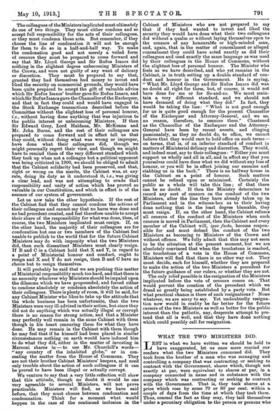WHAT THE TWO MINISTERS DID.
TEST in what we have written we should be held to I have exaggerated, let us once more remind our readers what the two Ministers concerned did. They took from the brother of a man who was managing and controlling a company that was contracting or seeking to contract with the Government, shares which, though not exactly at par, were equivalent to shares at par, in a company connected in name and in substance with the company which was contracting or seeking to contract with the Government. That is, they took shares at a price which rose by some 70 or 80 per cent. within a couple of days from the time at which they took them. Thus, conceal the fact as they may, they laid themselves under a pecuniary obligation to the person or persons who parted with the shares at a much lower price than they were really worth. The Attorney-General thinks he is excused for his action because the persons who laid him under this pecuniary obligation were his brothers. Mr. Lloyd George can only plead that the person who laid him under the pecuniary obligation, but who was enabled to do so through the ultimate kindness of a brother who was contracting or seeking to contract with the Government, was an intimate friend.
All this means, paint it how we will, that the two Ministers were, in effect, doing what people do when they become interested in a company by getting shares at par when the public can only get them at a greatly augmented price. Beyond and above their " getting in on the ground floor," and so placing themselves under a pecuniary obligation at two removes to Mr. Godfrey Isaacs, the Ministers admit to complicated transactions on the Stock Exchange, which they call " investment " but which everybody else calls " speculation," and speculation of a kind which it is most undesirable that any public officials, high or low, should while in office engage in—speculations on borrowed money. They thus set the worst possible example to the whole public service. Further, they concealed from Parliament the transactions we have just described, and they did not merely refrain from saying what they ought to have said, but used language in the House of Commons which it cannot be denied gave the impression to the ordinary man that they had not entered into the transactions into which in fact they had entered, and which must have been in their minds while they spoke in the House of Commons. What makes the matter worse for the Chancellor of the Exchequer is that we know him to have been in this question sinning against the light.
In firm and merciless language he arraigned Mr. Chamberlain for doing things which were far less open to criticism, and in doing so insisted that the only standard which could be allowed for Cabinet Ministers was the standard of Caesar's wife, a standard under which it is not enough to say that actions are innocent per se and free from corruption, but which exacts conduct not calculated in the slightest degree to colour the public mind with suspicion. As a solicitor he cannot plead ignorance of business methods, or argue that he had never realized, till the public began to suspect and criticize, the true nature of his actions. Further his speech and the speeches of Lord Haldane, Mr. McKenna, and Mr. John Burns in their places in Parliament in 1900 take absolutely from Mr. Lloyd George the power of excusing his action by pleading ignorance of the best official tradition, and take from Lord Haldane, Mr. McKenna, and Mr. John Burns the power of condoning the action of their colleagues as due to want of knowledge and experience. The Minister chiefly implicated and the colleagues who in the last resort must judge his action had all of them thirteen years ago fully considered the problem of Ministerial responsibility in the matter of investments in all its bearings, and had come to certain very definite and clear conclusions thereon. The principles involved in these conclusions were violated by the action taken by the Chancellor of the Exchequer when he entered upon his Stock Exchange transactions in American Marconis last year.











































 Previous page
Previous page